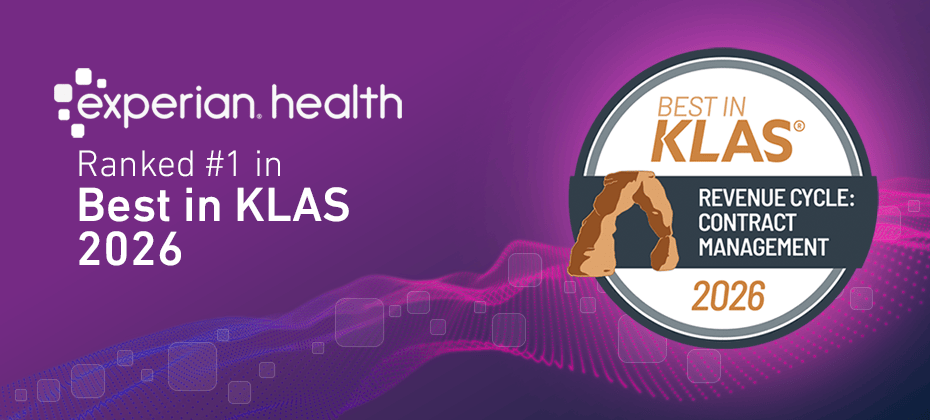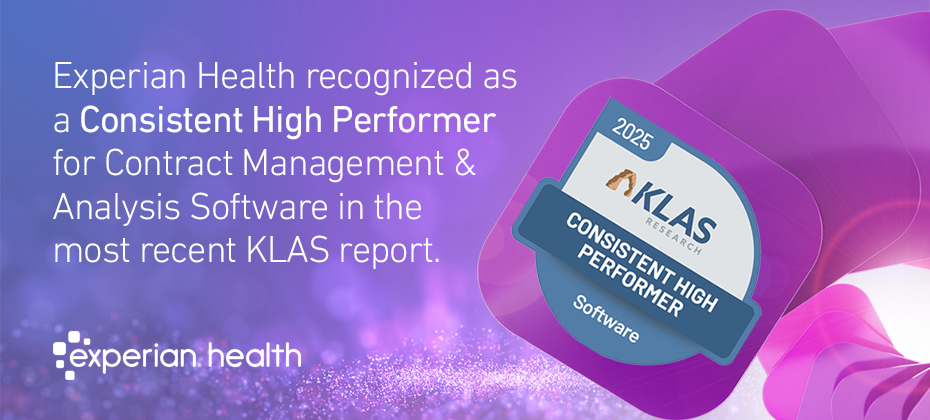
Contracts govern the revenue cycle, but negotiating contracts and ensuring compliance can feel increasingly unmanageable as mergers and acquisitions, ongoing staffing challenges, and the sheer volume of contracts, plans, and provisions make contract management a massive project for healthcare providers.
Tricia Ibrahim, Director of Product Management at Experian Health, shares her insights on a challenging environment heading into 2024. Providers are grappling with mounting complexity, an explosion of data, and continuing pressure to maximize efficiency and revenue. But, according to Ibrahim, healthcare contract management software is evolving to meet these challenges—and helping providers find clarity amid the complication.
Q1: What are the major challenges with healthcare contract management as we move into 2024?
“I think what clients are most concerned with, especially leading into 2024, is the complexity of payer contracts,” says Ibrahim. A typical provider may manage hundreds or thousands of contracts, each one with a range of plans and provisions that affect the bottom line. “Being able to negotiate better contracts is a key concern,” says Ibrahim, “but clients increasingly feel outgunned and overwhelmed by the amount of information involved.”
Accessing and analyzing data effectively is more critical than ever. “When providers come together with payers to negotiate contracts, it can be difficult for them to evaluate the contract that the payer is putting in front of them,” in part because it’s hard to know how their current contract is performing or how contract provisions will play out in dollars and cents, Ibrahim explains. “Underpayments and denials are a constant struggle. Also, providers need to understand how volume and patient mix will factor in.”
Contract management has a direct effect on revenue and the bottom line. Negotiated terms may or may not cover actual costs. A small change in terms might have an outsized effect due to high volume. Denied claims, underpayments, downcoding and late payments can slow the revenue cycle and reduce the amount of revenue providers receive.
“At the same time, we’re also starting to see a greater interest in collaboration between providers and payers,” says Ibrahim. “Having additional visibility allows both parties to have more meaningful discussions and move toward solutions that work for everyone.”
Q2: What are providers doing to take on these challenges?
“Many providers are investing in technology,” says Ibrahim. “A 2023 analysis by Bain & Company found that 80% of healthcare executives had accelerated software and IT investment over the past year in response to mergers and acquisitions, staffing shortfalls, and an increasing need for efficiency.” As contract management becomes more complex, providers are also reaching for more powerful healthcare contract management software tools to manage data—and leverage it to negotiate contracts effectively and monitor contract compliance over time.
Q3: How can healthcare contract management software like Experian Health’s Contract Manager and Contract Analysis help providers negotiate better contracts?
“Having meaningful information backed by data changes the dynamic,” Ibrahim says. “It allows you to have a more strategic conversation. You can say, ‘You’re supposed to pay us 45 days from the receipt of the claim, but it’s been taking 140 days.’” Data provides objective information and can point the way toward measurable improvements going forward.
“Our Contract Analysis module allows for the provider to audit payer contract performance,” says Ibrahim. That’s not only helpful for tracking what’s happened to date; it’s also useful for projecting how a new contract might work going forward. “We’re able to use historical claims to create scenarios that show how a new contract would affect payment. Sometimes, payers will keep reimbursement rates the same where you have a lot of volume and give you an increase where you don’t. When you use our solution to run these types of analyses, you get a more effective understanding of proposed terms.”
Q4: Once contracts are in place, how can healthcare contract management software help providers improve compliance?
“Detailed analysis is key, and small discrepancies can have a significant impact,” says Ibrahim. “One of our clients, a large academic provider on the medical group side, spotted a trend where they were being underpaid by 10 cents to 50 cents on their EKGs. These kinds of variances typically go unnoticed, but they found 20 or 30 claims to submit.” The payer acknowledged the underpayment and issued the few dollars’ difference.
“Then the provider decided to look at their contract to see how far back they could appeal. It turned out they were able to go back a significant amount of time. When they added up the underpayments, it equated to $850,000. They ended up settling for $750,000,” Ibrahim says.
OrthoTennessee, a Knoxville-based orthopedic practice with multiple locations and more than 50 physicians, uses Experian Health’s Contract Management software for healthcare to find inaccuracies, make appeals, and audit contracts at scale. Using Experian Health’s Contract Management platform, OrthoTennessee had an 86% success rate for appeals in 2022.
“That’s the power of the solution: You can really identify trends,” says Ibrahim. Monitoring compliance is a continuous effort: “We’ve done a lot of work with our clients to understand what their evolving needs are. We’ve been named Best in KLAS [by healthcare IT research firm KLAS] multiple years in a row. That recognition has centered around engagement—being engaged with our clients, so we understand what the trends are, what challenges they’re facing, and how we can help solve problems in the most efficient manner.”
Q5: What role do regulations play in shaping contract management solutions?
“Regulation drives different reimbursement methodologies, [such as] bundled payments or value-based care,” says Ibrahim. “Part of our challenge is making sure we are always evaluating new regulations and ensuring that our system is agile enough to support these new methodologies.
“Because regulation never stops, it actually drives a lot of the innovation we do. The No Surprises Act, which came into effect in 2021, requires providers to provide patients with a good faith estimate of costs. We’ve been able to help clients establish an estimated median rate, which can be useful for estimates that involve non-contracted payers.”
As an additional benefit, healthcare contract management software also helps providers spot opportunities. “One of our clients identified 26 plans with enough volume to support additional contracts,” says Ibrahim. “Providers can even use these solutions to evaluate whether a market exists for a new piece of technology to deliver state-of-the-art care. Understanding performance is a powerful tool.”
Q6: Early in our conversation, you said there was a growing interest in collaboration among providers and payers. What does it mean to take a collaborative approach in this context?
“I think it’s really important for providers and payers to have collaborative communication, to engage in productive conversations where they can work together instead of against each other,” says Ibrahim. “That’s how we’re going to deliver more integrative care and reduce costs. It’s how we’re going to arrive at coverage options that work for all parties, by developing good relationships between providers and payers.
“For our part, Experian Health is continuing to expand Contract Manager to provide data analytics that clearly show the cost of care and the expected reimbursement for various types of services, so providers can evaluate contract performance, identify potential areas of improvement, and have meaningful conversations with payers.
“At the end of the day, we all have a common goal: delivering appropriate care at the right time for patients,” Ibrahim concludes. “To progress toward that goal, payers, providers and partners like Experian Health are going need to work together.” These conversations start with a common set of data, so that everyone at the table understands where the opportunities to collaborate and improve may lie—and where the path forward may begin.
Learn more about Experian Health’s Healthcare Contract Management software and how it can help your organization negotiate and manage contracts effectively and efficiently, even in an increasingly complex environment.


